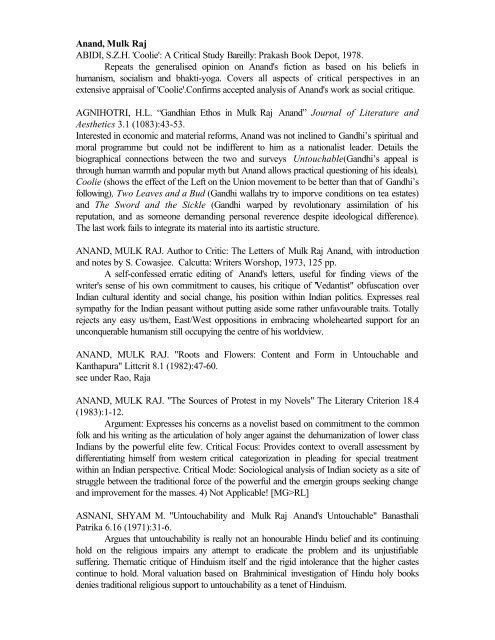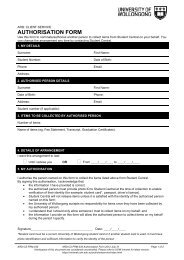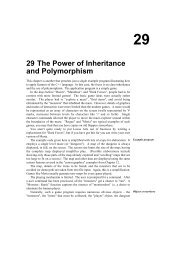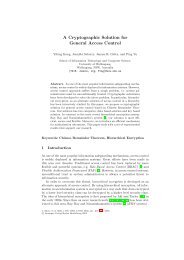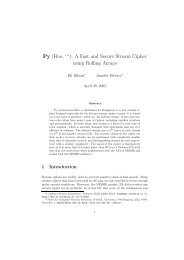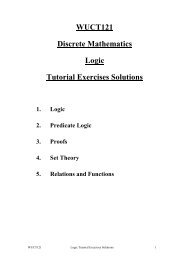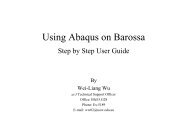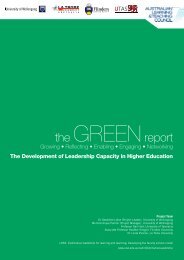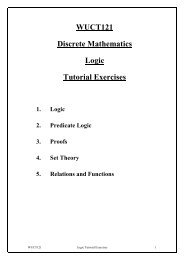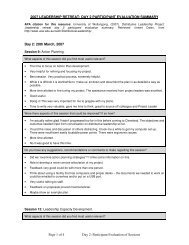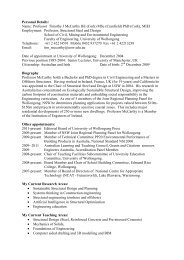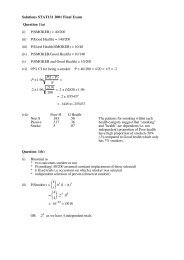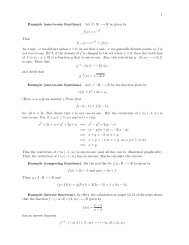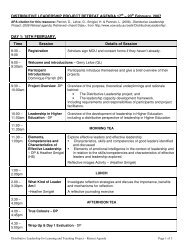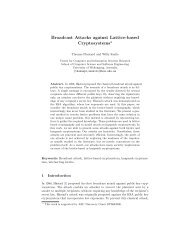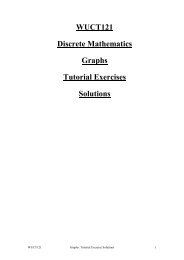india author m 1- a-nan - University of Wollongong
india author m 1- a-nan - University of Wollongong
india author m 1- a-nan - University of Wollongong
Create successful ePaper yourself
Turn your PDF publications into a flip-book with our unique Google optimized e-Paper software.
A<strong>nan</strong>d, Mulk Raj<br />
ABIDI, S.Z.H. 'Coolie': A Critical Study Bareilly: Prakash Book Depot, 1978.<br />
Repeats the generalised opinion on A<strong>nan</strong>d's fiction as based on his beliefs in<br />
humanism, socialism and bhakti-yoga. Covers all aspects <strong>of</strong> critical perspectives in an<br />
extensive appraisal <strong>of</strong> 'Coolie'.Confirms accepted analysis <strong>of</strong> A<strong>nan</strong>d's work as social critique.<br />
AGNIHOTRI, H.L. “Gandhian Ethos in Mulk Raj A<strong>nan</strong>d” Journal <strong>of</strong> Literature and<br />
Aesthetics 3.1 (1083):43-53.<br />
Interested in economic and material reforms, A<strong>nan</strong>d was not inclined to Gandhi’s spiritual and<br />
moral programme but could not be indifferent to him as a nationalist leader. Details the<br />
biographical connections between the two and surveys Untouchable(Gandhi’s appeal is<br />
through human warmth and popular myth but A<strong>nan</strong>d allows practical questioning <strong>of</strong> his ideals),<br />
Coolie (shows the effect <strong>of</strong> the Left on the Union movement to be better than that <strong>of</strong> Gandhi’s<br />
following), Two Leaves and a Bud (Gandhi wallahs try to imporve conditions on tea estates)<br />
and The Sword and the Sickle (Gandhi warped by revolutionary assimilation <strong>of</strong> his<br />
reputation, and as someone demanding personal reverence despite ideological difference).<br />
The last work fails to integrate its material into its aartistic structure.<br />
ANAND, MULK RAJ. Author to Critic: The Letters <strong>of</strong> Mulk Raj A<strong>nan</strong>d, with introduction<br />
and notes by S. Cowasjee. Calcutta: Writers Worshop, 1973, 125 pp.<br />
A self-confessed erratic editing <strong>of</strong> A<strong>nan</strong>d's letters, useful for finding views <strong>of</strong> the<br />
writer's sense <strong>of</strong> his own commitment to causes, his critique <strong>of</strong> "Vedantist" obfuscation over<br />
Indian cultural identity and social change, his position within Indian politics. Expresses real<br />
sympathy for the Indian peasant without putting aside some rather unfavourable traits. Totally<br />
rejects any easy us/them, East/West oppositions in embracing wholehearted support for an<br />
unconquerable humanism still occupying the centre <strong>of</strong> his worldview.<br />
ANAND, MULK RAJ. "Roots and Flowers: Content and Form in Untouchable and<br />
Kanthapura" Littcrit 8.1 (1982):47-60.<br />
see under Rao, Raja<br />
ANAND, MULK RAJ. "The Sources <strong>of</strong> Protest in my Novels" The Literary Criterion 18.4<br />
(1983):1-12.<br />
Argument: Expresses his concerns as a novelist based on commitment to the common<br />
folk and his writing as the articulation <strong>of</strong> holy anger against the dehumanization <strong>of</strong> lower class<br />
Indians by the powerful elite few. Critical Focus: Provides context to overall assessment by<br />
differentiating himself from western critical categorization in pleading for special treatment<br />
within an Indian perspective. Critical Mode: Sociological analysis <strong>of</strong> Indian society as a site <strong>of</strong><br />
struggle between the traditional force <strong>of</strong> the powerful and the emergin groups seeking change<br />
and improvement for the masses. 4) Not Applicable! [MG>RL]<br />
ASNANI, SHYAM M. "Untouchability and Mulk Raj A<strong>nan</strong>d's Untouchable" Banasthali<br />
Patrika 6.16 (1971):31-6.<br />
Argues that untouchability is really not an honourable Hindu belief and its continuing<br />
hold on the religious impairs any attempt to eradicate the problem and its unjustifiable<br />
suffering. Thematic critique <strong>of</strong> Hinduism itself and the rigid intolerance that the higher castes<br />
continue to hold. Moral valuation based on Brahminical investigation <strong>of</strong> Hindu holy books<br />
denies traditional religious support to untouchability as a tenet <strong>of</strong> Hinduism.


